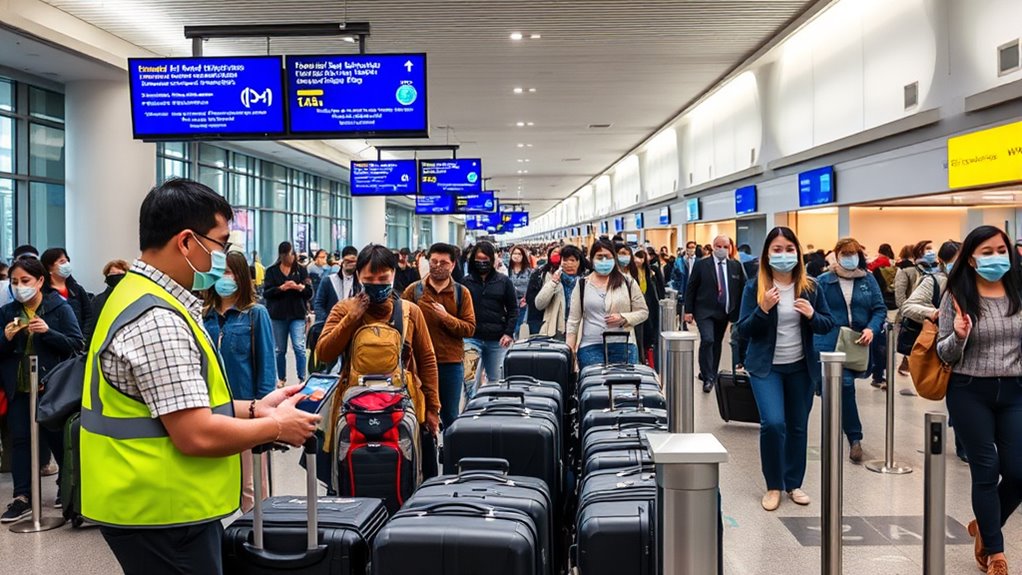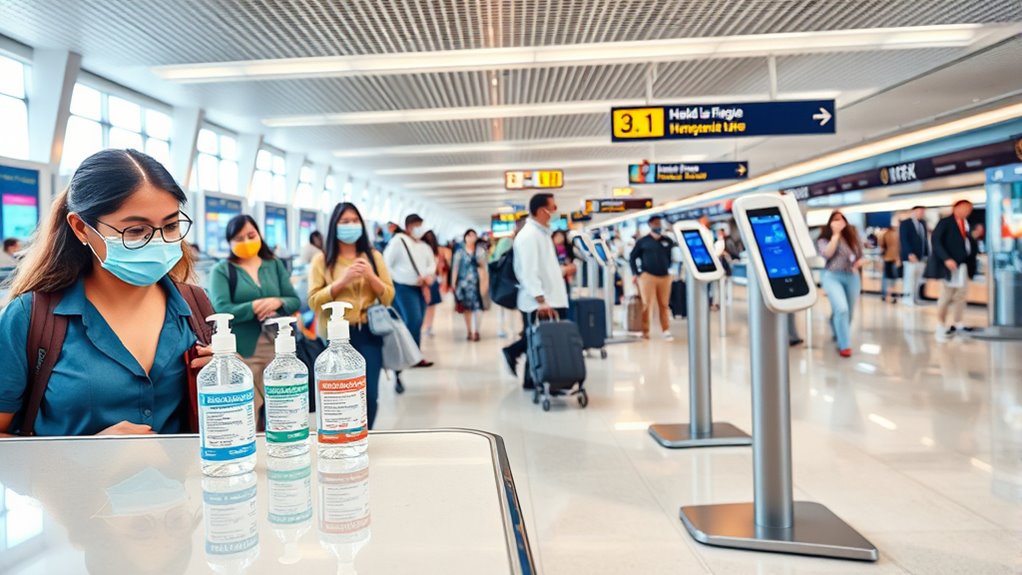To stay safe and healthy while traveling, stay informed about your destination’s risks and prepare appropriately. Carry a well-stocked first aid kit, keep up with necessary vaccinations, and practice good hygiene to prevent illness. Know where to find medical help if needed and stay aware of local safety conditions. Using travel insurance and security services can provide added protection. Keep exploring to discover more practical tips for a secure and healthy journey.
Key Takeaways
- Carry a well-stocked first aid kit and stay updated on vaccinations to prevent illness and manage minor injuries.
- Know where to find local medical facilities and understand the healthcare system at your destination.
- Stay informed about current safety threats, travel advisories, and security zones to plan safe routes.
- Practice good hygiene, implement safety measures, and prepare personal safety plans to reduce risks during travel.
- Obtain comprehensive travel insurance and consider security services to cover emergencies and ensure assistance abroad.

Traveling can be exciting, but it also comes with risks that you need to be prepared for. When you’re exploring new places, your health and safety should be top priorities. Illness and injury are among the biggest concerns for travelers in 2025, with more than a third citing them as their primary worry. Whether it’s catching an illness due to unfamiliar germs or sustaining an injury during activities, you need to stay vigilant. Carrying a well-stocked first aid kit, staying updated on vaccinations, and practicing good hygiene can help reduce these risks. Also, knowing where to find medical assistance abroad is essential—some regions have limited healthcare access, which can escalate health concerns quickly. Pre-travel health consultations are highly recommended to identify specific risks based on your destination and personal health conditions. Civil unrest and terrorism, although slightly less prominent than before, still pose credible threats depending on your destination. It’s wise to check travel advisories before booking your trip, especially to regions like the Middle East or Burkina Faso, where safety has deteriorated. Petty crime remains a concern in many popular tourist spots, so always stay alert in crowded areas and keep your valuables secure. A little extra caution can prevent theft or other safety incidents. Additionally, geopolitical instability affects nearly a quarter of travelers, so understanding the current situation of your destination can help you avoid sudden disruptions or dangerous situations. Being aware of the security situation in your travel region can further enhance your safety planning. Staying informed with reliable sources can also help you identify security zones and plan your routes accordingly. Moreover, reviewing local customs can help prevent misunderstandings that could escalate into safety issues. Preparing a personal safety plan tailored to your destination can also be a valuable step in your safety preparation.
Economic instability also impacts your travel plans—rising costs and fluctuating currencies mean you should budget carefully and consider purchasing all-encompassing travel insurance. This can help protect against unforeseen expenses, including medical emergencies or trip cancellations. Many travelers already use security extraction services, with about 24% having protection in place, and another 17% planning to get coverage. These services can be lifesaving if you encounter serious issues abroad. Safety levels vary widely across the globe. Countries like Canada, Norway, and Switzerland are generally considered very safe, while high-risk destinations such as Somalia, Syria, and Yemen should be avoided unless absolutely necessary. Even within cities, safety can differ; some urban areas are safer than others. Staying informed about current risks through travel alerts and risk maps helps you make smart choices. Implementing risk mitigation strategies, such as contingency planning and staying aware of local customs, can considerably enhance your safety. Remember, being prepared and informed is your best defense against travel risks. By taking these precautions, you can enjoy your trip with peace of mind, knowing you’ve minimized potential dangers along the way.
Frequently Asked Questions
How Can I Find Local Emergency Contacts Abroad?
You can find local emergency contacts abroad by researching official websites like Travel.gov and Wikipedia, which list emergency numbers for each country. Ask hotel staff or local guides for guidance, and save these numbers in your phone or on paper. Carrying a printed list guarantees you’re prepared. Also,, check if your mobile supports emergency calls with local or international numbers, so you’re ready if needed.
What Should I Do if I Lose My Travel Insurance Details?
If you lose your travel insurance details, start by checking your email inbox and spam folders for any copies. Contact your insurer directly to request a new copy or access your policy online through the insurer’s portal or comparison sites like MoneySuperMarket. Keep a digital backup of all important documents in secure cloud storage, and consider storing physical copies in a safe place to avoid future loss.
Are There Specific Vaccinations Required for Certain Destinations?
Think of your destination as a key that opens specific health needs. You’ll want to check if certain vaccinations are required or recommended, like Yellow Fever for Brazil or Colombia, or Measles for all international travelers. Always verify with official sources like the CDC or WHO. Vaccinating well in advance guarantees you’re protected and travel-ready, preventing any surprises or entry issues upon arrival.
How Do I Handle Food Allergies in Unfamiliar Countries?
When handling food allergies in unfamiliar countries, you should inform airlines about your allergies beforehand and carry allergy documentation and translation cards. Use translation apps and visual aids to communicate your needs clearly. Research local healthcare options and learn key phrases in the local language. Always carry emergency medication like an EpiPen and inform hotels and restaurants about your allergies. Connecting with local support groups can also provide helpful tips and reassurance.
What Are Tips for Staying Safe During Solo Travel?
Safety is your shield on solo adventures. You actively research your destination, choosing places with low crime and good reviews. You learn key phrases to seek help when needed and stick to reputable transportation options. You keep valuables secure and avoid isolated areas after dark. Staying connected with loved ones and being vigilant about your surroundings transforms your journey from risky to rewarding, turning every challenge into an opportunity for growth.
Conclusion
Remember, your health and safety are the compass guiding your journey. Stay vigilant, follow safety tips, and listen to your body’s signals—it’s your trusted map through unfamiliar territory. By prioritizing these precautions, you turn potential obstacles into mere stepping stones. After all, isn’t life’s greatest adventure about exploring with confidence and care? Keep your eyes open, your heart brave, and your spirit adventurous—because the world is waiting for you to discover it safely.









